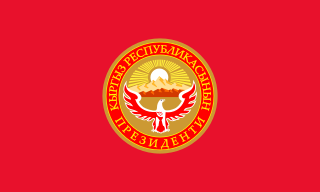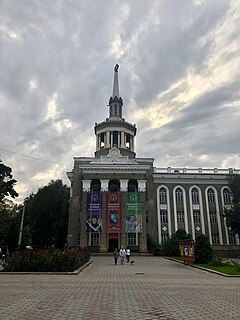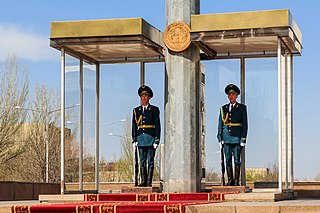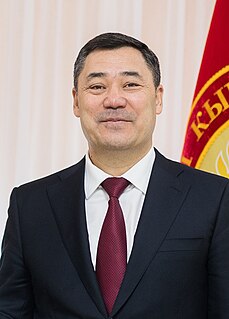Related Research Articles

The National Anthem of the Kyrgyz Republic is the title of the current national anthem of Kyrgyzstan, adopted on 18 December 1992 by a resolution of the Supreme Council of Kyrgyzstan. The music was composed by Naseur Davlesov and Kaleui Moldobasanov, and the words were written by Zhalil Sadeukov and Shabdanbek Kuluyev.

The president of Kyrgyzstan officially the president of the Kyrgyz Republic, is the head of state and the head of government of the Kyrgyz Republic. The president directs the executive branch of the national government and is the commander-in-chief of the Kyrgyz military. The president also heads the National Security Council.

The Ministry of Foreign Affairs is the Kyrgyz government ministry which oversees the foreign relations of Kyrgyzstan.
The Ministry of Emergency Situations of Kyrgyzstan is a special ministry in Kyrgyzstan dedicated to the response of natural disasters such as earthquakes or landslides or serious accidents. The current emergencies minister is Boobek Ajikeev.

The International University of Kyrgyzstan is a private international university in Bishkek, the capital of Kyrgyzstan.

Prisons in Ukraine are regulated by the State Penitentiary Service of Ukraine, a part of the Ministry of Justice of Ukraine.

After the fall of the Soviet Union, the independent Ukrainian country underwent tremendous stress when it shifted from a centrally planned economy to a free market system. Those changes, led by the post-communist oligarchy, caused an increasing number of impoverished and homeless people in Ukraine during 1990s. The crime rate and the prison population grew until 2001. Changes in penal policy of the Ukrainian government started after the pontifical visit of Pope John Paul II to Ukraine.

The Federal Penitentiary Service is a federal agency of the Ministry of Justice of Russia responsible for correctional services.

The Ministry of Justice of the Russian Federation is a ministry of the Government of Russia responsible for the legal system and penal system.

The Border Guard Service of the State Committee for National Security of the Kyrgyz Republic also commonly known as the Kyrgyz Frontier Force is the border guard of the Kyrgyz Republic. It is currently a Public Service department of the government of the republic and is not part of any ministries.

Denys Viktorovych Chernyshov is Ukrainian politician and economist. He has been a Deputy Minister of Justice of Ukraine since October 19, 2016.

The Ministry of Internal Affairs of Kyrgyzstan is a Government ministry that is connected to the Armed Forces of the Republic of Kyrgyzstan. The organization also commands the Kyrgyz Frontier Force and administers the Academy of the Ministry of Internal Affairs of the Kyrgyz Republic.

The Ministry of Defense of the Kyrgyz Republic, formerly known as the State Committee for Defense Affairs, is the main executive body responsible for the Armed Forces of Kyrgyzstan, having the authority to is responsible for the readiness of the military command and the control bodies in its ranks. In accordance with legislation connected to the armed forces. The current Minister of Defense is Major General Baktybek Bekbolotov.

The National Guard of Kyrgyzstan is the National Guard of the Armed Forces of the Republic of Kyrgyzstan. The national guard was founded on December 6, 1991 by order of President Askar Akayev. The troops took their first oath July 20, 1992. It carries out functions of a representative and protocol nature, protection and protection of strategic facilities of the country, liquidation of the consequences of natural disasters and emergency situations. In 2014, the Internal Troops of the Ministry of the Interior were absorbed into the National Guard as a result of military reforms in the country. This arrangement would stay until September 2018 when the two were separated and the Internal Troops were reformed. In 2016, the Commander of the National Guard was put onto the General Staff of the Armed Forces.

State awards of the Kyrgyz Republic include the orders, decorations, and medals in Kyrgyzstan. They consist of military and civil decorations that are bestowed by various agencies of the government.
Law enforcement in the Kyrgyz Republic is primarily the responsibility of the Ministry of Internal Affairs. The ministry commands the police force, also known locally as militsiya, directly and thus policemen carry the insignia of the ministry (ИИМ). This structure of law enforcement is similar to its predecessors and many other post-Soviet states. The ministry is subdivided into numerous departments that tackle the different aspects of law enforcement in the Kyrgyz Republic and is also supported simultaneously by other governmental agencies. The police is contactable via the emergency hotline number 102.

The Prosecutor General's Office of Kyrgyzstan is a Kyrgyz government agency which is responsible for maintaining and supervising the public procurator system in Kyrgyzstan. The Prosecutor General of Kyrgyzstan is the highest government judicial official in Kyrgyzstan, who oversees the enforcement of the Kyrgyz legal system and the activities of law enforcement agencies. The Prosecutor General is nominated by the President of Kyrgyzstan and is confirmed by the Supreme Council. The office is located on 139 Toktonaliyev Street in the capital of Bishkek.
The State Committee for National Security is the national agency responsible for intelligence on counter terrorism and organised crime in Kyrgyzstan. In carrying out this task, it carries out both preventive and investigative measures against organized terrorism and crime. The chairman of the UKMK is a military officer and a member of the Security Council of Kyrgyzstan. It is currently based on 70 Erkindik Street, Bishkek.
The State Migration Service of the Government of the Kyrgyz Republic is a governmental organization implementing state policy for migration in Kyrgyzstan. Kaymazarov Tashtanbek Turarovich was appointed, starting from 21 October 2020, to become the current Chairman of the State Migration Service.

Sadyr Nurgozho uulu Japarov is a Kyrgyz politician who has served as the president of Kyrgyzstan since 28 January 2021. He had previously served as the acting prime minister of Kyrgyzstan in the 2020 interim government following the resignation of Sooronbay Jeenbekov on 15 October 2020 amidst electoral protests. Japarov also became acting president of Kyrgyzstan after Jeenbekov's resignation but resigned himself on 14 November 2020. On 10 January 2021, Japarov was elected president.
References
- 1 2 3 "History of GSIN of Kyrgyz Republic". 2018. Retrieved 2018-11-05.
- ↑ "Комплекс "Ата-Бейит" переименовали в национальный историко-мемориальный". 2016-09-07. Retrieved 2018-11-19.
- ↑ "Establishment of the State Penitentiary Service". 2018. Retrieved 2018-11-05.
- ↑ "Положение о ГСИН". 2011-10-04. Retrieved 2018-11-19.
- ↑ "Structure in side navigation bar". 2018. Retrieved 2018-11-19.
- ↑ "Руководящий состав". 2018. Retrieved 2018-11-19.
- ↑ "ГОСУДАРСТВЕННАЯ СЛУЖБА ИСПОЛНЕНИЯ НАКАЗАНИЙ ПРИ МИНИСТЕРСТВЕ ЮСТИЦИИ КЫРГЫЗСКОЙ РЕСПУБЛИКИ". gsin.gov.kg. Retrieved 2021-03-17.
- ↑ "Products manufactured by GSIN Institutions". 2018. Retrieved 2018-11-05.
- ↑ "Результаты проверки рабочей группой подразделений и служб УИС". 2017-10-31. Retrieved 2018-11-19.
- ↑ "Отремонтированные объекты ИК 47". 2018-08-15. Retrieved 2018-11-19.
- ↑ "Координационный совет по реформированию уголовно-исполнительной системы Кыргызской Республики". 2018. Retrieved 2018-11-19.
- ↑ "Support to Criminal Justice and Prison Reform in The Kyrgyz Republic". 2014. Retrieved 2018-11-05.
- ↑ "Kyrgyzstan mulls return to death penalty". 2009-10-16. Retrieved 2018-11-05.
- ↑ "State Penitentiary Service Day Kyrgyz Republic". 2018. Retrieved 2018-11-05.
- ↑ "Kyrgyz police kill suspected Islamist escapee from prison in shootout". 2015-10-22. Retrieved 2018-11-05.
- ↑ "Rights group urges Kyrgyzstan to end 'abusive crackdown' on extremism". 2018-09-19. Retrieved 2018-11-05.
